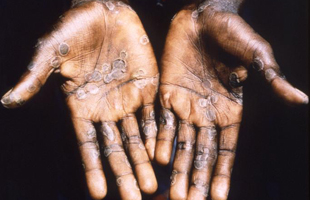Monkeypox virus (MPXV) 15/05/2019 – Posted in: Daily News – Tags: Monkeypox, MPVX, smallpox, south africa
MONKEYPOX VIRUS
For: Preliminary
Topics Covered: MPVX, Cause, Symptoms, Treatment
News Flash
Singapore has reported its first ever case of monkeypox, brought in by a Nigerian man thought to have contracted the rare virus by eating bushmeat at a wedding.
|
Bushmeat, which can be chimpanzee, gorilla, antelope, birds or rodent, is a staple of some African diets. |
- Outside Africa, human monkeypox infections had only been previously reported in the United States, Britain and Israel.
Symptoms in humans of Monkeypox
- Lesions, fever, muscle ache and chills.
- Monkeypox typically lasts for two to four weeks, starting as a fever and headache and progressing through to small bumps called pustules that spread over the body.
- Skin rashes appear often beginning on the face and then spread elsewhere on the body. These lesions evolve from maculopapules (lesions with a flat bases) to vesicles (small fluid-filled blisters), pustules, followed by crusts.
Causes
Monkeypox is a viral zoonosis, i.e. a disease transmitted from animals to humans. It can be transmitted through contact with the blood, bodily fluids, or cutaneous or mucosal lesions of infected animals. Human infections have been documented through the handling of infected monkeys, Gambian giant rats and squirrels, with rodents being the most likely reservoir of the virus.
Transmission
- Transmission is usually via close contact with infected animals such as rodents and monkeys and is limited between people.
- It is not normally fatal but has been in rare cases.
Natural host of Monkeypox virus
In Africa, monkeypox infection has been found in many animal species: rope squirrels, tree squirrels, Gambian rats, striped mice, dormice and primates. Doubts persist on the natural history of the virus and further studies are needed to identify the exact reservoir of the monkeypox virus and how it is maintained in nature.
In the USA, the virus is thought to have been transmitted from African animals to a number of susceptible non-African species (like prairie dogs) with which they were co-housed.
Treatment
There are no specific treatments or vaccines available for monkeypox virus infection, but outbreaks can be controlled.
Vaccination against smallpox has been proven to be 85% effective in preventing monkeypox in the past but the vaccine is no longer available to the general public after it was discontinued following global smallpox eradication.
Prevention and Control
Prevention consists in avoiding any contact with rodents and primates as well as limiting direct exposure to blood and inadequately cooked meat.
Close physical contact with infected people or contaminated materials should be avoided. Gloves and other appropriate protective clothing should be worn while handling sick animals or their infected tissues and when taking care of ill people.
Monkeypox Virus
Monkeypox virus (MPXV) is an orthopoxvirus that causes a viral disease with symptoms in humans similar, but milder, to those seen in smallpox patients. Smallpox was declared eradicated in 1980, whereas human monkeypox is endemic in villages of Central and West Africa. The occurrence of cases is often found close to tropical rainforests where there is frequent contact with infected animals. There is no evidence to date that person-to-person transmission alone can sustain monkeypox in the human population.
Source: Business Standards
You can follow us on LinkedIn and for more updates related to UPSC IAS Preparation, Like our Facebook Page and subscribe our Diligent IAS Youtube Channel
Also Read Related Daily News

